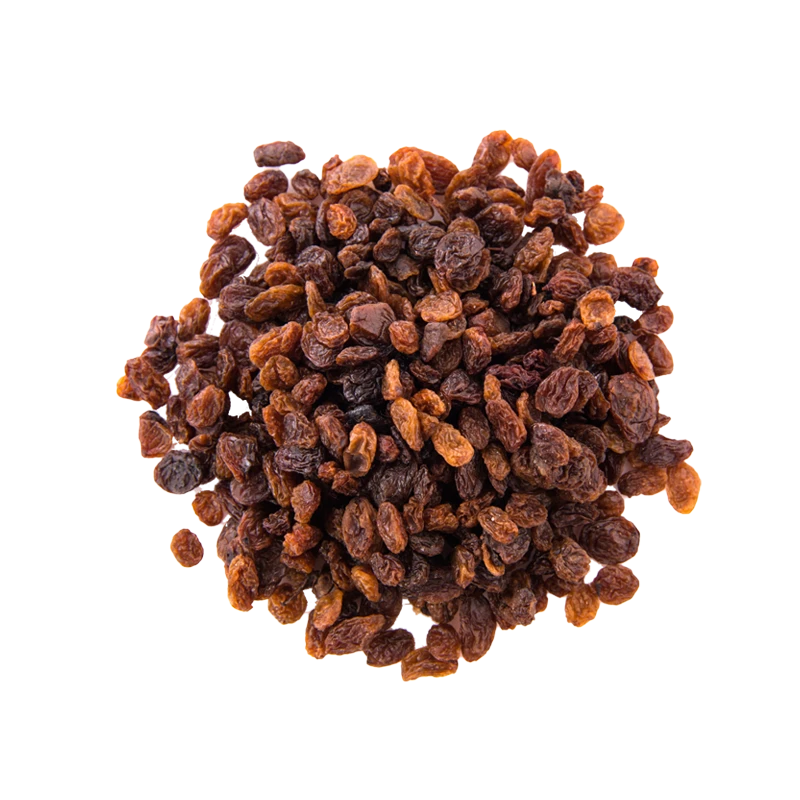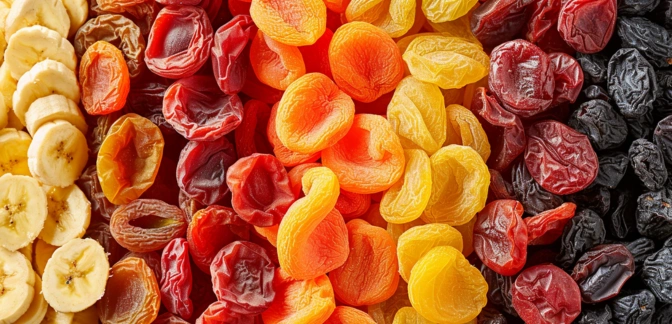Raisins — Nutrients, Health Benefits, And Shopping Tips

Written by Listonic Team
Last update on September 4, 2024
Raisins nutrients
Nutrition facts
Amount per 100 g
Calories
🔥 299 kcal
| Nutrition per: 100 g | Value | % Daily Value* |
|---|---|---|
| Carbs | 79 g | 28.73% |
| Fiber | 4 g | 14.29% |
| Sugars | 59 g | 118% |
| Glycemic Index | 64 | - |
| Protein | 3 g | 6% |
| Sodium | 11 mg | 0.48% |
| Total Fat | 1 g | 1.28% |
*The % of Daily Value (DV) tells you how much a nutrient in a serving of food contributes to a daily diet. 2,000 calories a day is used for general nutrition advice.
1 g
🥕 Low Fat Content
Raisins facts & tips
Health benefits
- High in fiber, promoting digestive health, regular bowel movements, and a healthy gut microbiome.
- Rich in antioxidants such as phenols and polyphenols, which help protect the body from free radicals and reduce inflammation.
- Contains essential vitamins and minerals such as iron, potassium, and calcium, which support overall health and well-being.
- Provides quick energy from natural sugars, making them a convenient snack for athletes and active individuals.
- Supports bone health due to their boron content, which helps maintain bone density.
Health risks
- High sugar content as raisins are concentrated dried fruits, which can contribute to weight gain, tooth decay, and increased risk of diabetes when consumed frequently.
- High calorie content which can contribute to weight gain if consumed in large quantities, especially as a snack or ingredient in calorie-dense foods.
- Potential for digestive discomfort such as bloating or gas when consumed in large quantities due to their high fiber content.
- Risk of allergic reactions in some individuals, particularly those allergic to grapes, causing symptoms like itching, swelling, or difficulty breathing.
How to choose raisins
Raisins should be plump and soft, with a rich color and no hardening. They should clump minimally, showing they have retained some moisture. The texture should be chewy, not hard or crunchy.
Do not select raisins that are overly sticky or coated with sugar crystals, as these may have been improperly stored. Raisins that smell sour or fermented should also be avoided, as they may not be safe to consume.

How to store raisins
Raisins should be stored in an airtight container in a cool, dry place. Keeping them in the pantry helps maintain their sweetness and chewiness. Properly stored, raisins can last for up to a year.
Exposure to air and moisture can cause raisins to dry out and lose their flavor. Avoid storing them near heat sources or in humid environments. Always ensure the container is tightly sealed to keep them fresh and prevent spoilage.
✅ Extra Tip
How long do they last?
Raisins can last for 6-12 months when stored in an airtight container in a cool, dark place. For longer storage, raisins can be refrigerated or frozen, where they can last up to 1-2 years.
What to do with leftovers?
Leftover raisins can be used in a variety of sweet and savory dishes. Add them to salads, oatmeal, or yogurt for added sweetness and texture, or mix them into baked goods like cookies, bread, or muffins. Raisins are also great when mixed into a trail mix with nuts, seeds, and chocolate.
Use raisins in a stuffing or rice pilaf with nuts and spices, where their sweetness balances savory flavors. If you have a lot of raisins, consider making a batch of raisin preserves or compote to serve with cheese or spread on toast. Raisins can also be blended into a sauce or chutney for meats like lamb or pork, or used as a filling for stuffed vegetables or pastries. For a quick snack, enjoy raisins on their own, or mix them with peanut butter and celery for a classic “ants on a log” treat.
👨⚕️️ Medical disclaimer
Discover products from other categories
Listonic Team
Fact-checked
Our editorial team checked this article to make sure it was accurate at the time of publishing it.
Get the top-rated shopping list app

raisins
1 piece







